Tabela de conteúdo
Estratégia de marketing de podcast: Como aumentar seu público?
Os podcasts tiveram um grande aumento de popularidade nos últimos anos, com milhões de pessoas sintonizando-os diariamente. Com essa popularidade crescente, surge uma oportunidade para os profissionais de marketing usarem o marketing de podcast para alcançar novos públicos e expandir suas marcas.
Nesta postagem do blog, discutiremos dicas para aumentar o público do seu podcast.
Aqui estão algumas ótimas estratégias de marketing de podcast:
01 Envie seu podcast para diretórios
O envio do seu podcast para diretórios populares como Apple Podcasts, Spotify e Google Podcasts facilitará a localização e a assinatura do seu programa.
Depois que o podcast estiver no diretório, mantenha as informações do podcast atualizadas, inclusive o título, a descrição e os títulos e descrições dos episódios do podcast.
Avaliações e resenhas positivas podem ajudar seu podcast a se destacar no diretório e atrair novos ouvintes. Incentive os ouvintes a classificar e avaliar seu podcast no diretório em que ouvem o podcast.
O Brand24 é uma ferramenta que monitora mentions on-line em podcasts!
Graças à ferramenta de escuta social, você pode descobrir os sites e aplicativos de podcast mais ativos e influentes que correspondem ao seu podcast.
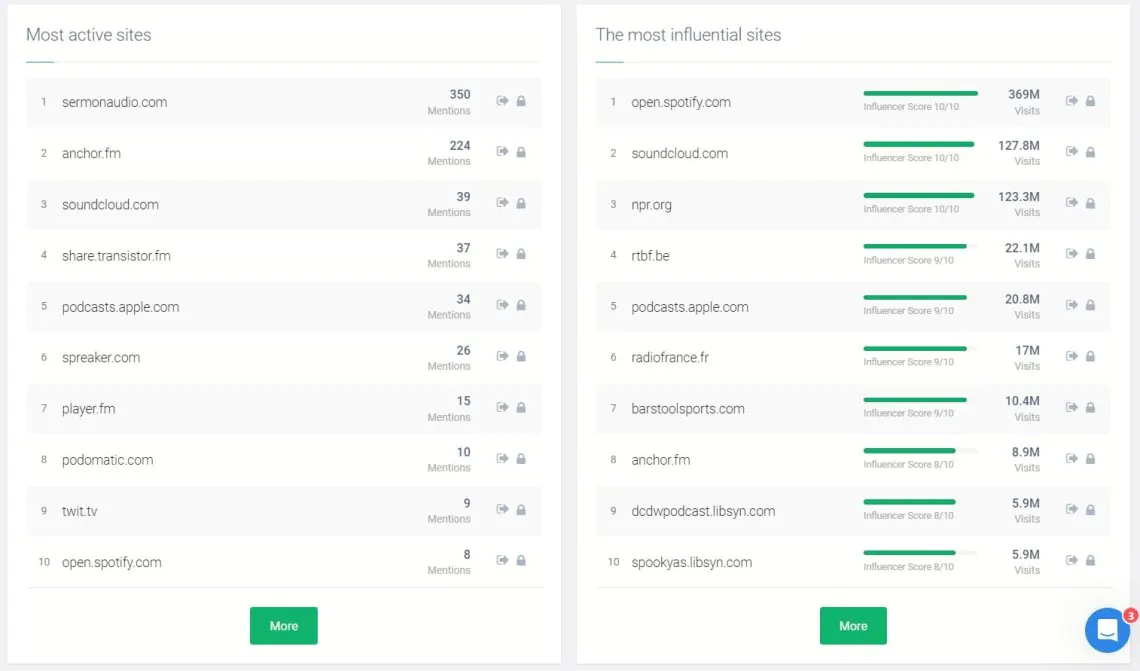
02 Use plataformas de mídia social
Plataformas como Twitter, Facebook e Instagram são ótimos lugares para promover seu podcast e se conectar com possíveis ouvintes. Você pode:
- Crie uma conta de mídia social dedicada ao seu podcast em plataformas como Twitter, Facebook e Instagram. Use essa conta para compartilhar atualizações sobre seu podcast e se conectar com possíveis ouvintes.
- Compartilhe o episódio do podcast em suas contas de mídia social assim que ele for lançado. Use legendas envolventes e inclua hashtags relevantes para aumentar a visibilidade.
- Compartilhe conteúdo dos bastidores em suas contas de mídia social, como fotos ou vídeos do estúdio de gravação, para dar aos seus seguidores uma visão geral da criação do seu podcast.
- Interaja com seus seguidores respondendo a comentários e mensagens e iniciando conversas sobre os tópicos do seu podcast. Isso pode ajudar a criar uma comunidade em torno de seu podcast e aumentar o envolvimento.
- Use plataformas de transmissão ao vivo como Facebook Live, Instagram Live ou YouTube Live para interagir com seus ouvintes em tempo real. Isso pode ajudá-lo a criar uma comunidade mais engajada em torno do seu podcast.
- Crie uma comunidade de mídia social para o seu podcast, como um grupo no Facebook ou um subreddit, onde os ouvintes possam discutir os episódios, fazer perguntas e compartilhar suas ideias.
03 Entre em contato com influenciadores
Identifique os influenciadores em seu nicho e entre em contato com eles para ver se estariam interessados em promover seu podcast ou aparecer como convidados em seu programa.
Veja como você pode fazer isso:
- Identifique influenciadores em seu nicho pesquisando blogs, podcasts e contas de mídia social populares relacionados ao tópico do seu podcast. Procure pessoas que tenham um grande número de seguidores engajados e que estejam alinhadas com os valores e a missão do seu podcast. Você pode usar um ferramenta de escuta social para essa finalidade. Essa ferramenta detectará os influenciadores que correspondem à sua marca.
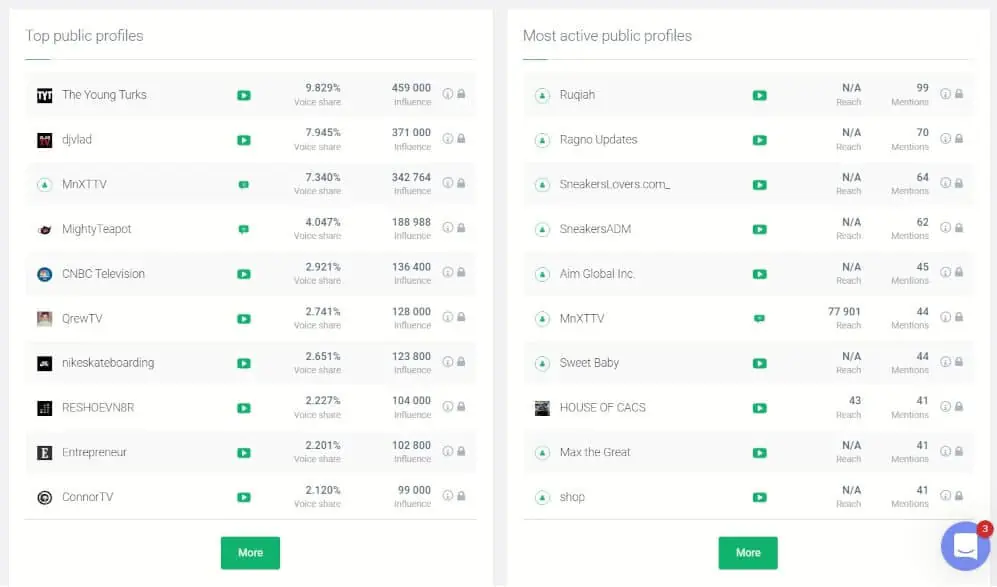
- Antes de entrar em contato com um influenciador, pesquise o conteúdo e o público-alvo dele para garantir que ele seja adequado para o seu podcast. Observe as contas de mídia social e o site deles para entender seus interesses e público-alvo.
- Em seguida, crie uma mensagem personalizada destacando por que você acha que o seu podcast seria uma boa opção para o público deles. Forneça exemplos específicos de como seu podcast se alinha com os interesses e valores deles e inclua um link para ele.
- Ofereça valor ao influenciador, como promover o conteúdo dele no seu podcast ou nos canais de mídia social. A criação de um relacionamento mutuamente benéfico pode aumentar as chances de ele promover seu podcast.
- Convide o influenciador para ser um convidado em seu podcast. Essa pode ser uma ótima maneira de alcançar o público dele e ganhar exposição para o seu programa.
- Entre em contato com o influenciador após a primeira mensagem e lembre-o do seu podcast e por que você acha que ele seria uma boa opção para o público dele.
04 Iniciar o monitoramento de podcast
Escuta social é uma ferramenta poderosa que pode ajudá-lo a promover seu podcast de forma mais eficaz. O monitoramento de podcast lhe dará uma visão do que o seu público está dizendo, no que ele está interessado e como ele percebe o seu podcast.
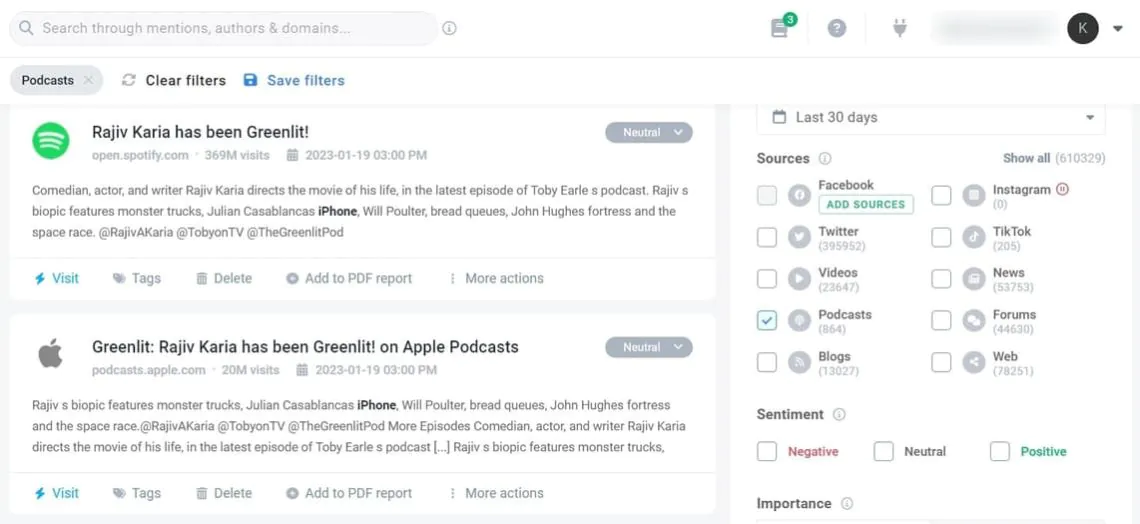
Aqui estão algumas maneiras de usar o listening social para promover seu podcast:
- Identifique os principais tópicos e hashtags relacionados ao nicho do seu podcast e configure alertas para rastrear mentions desses tópicos e hashtags. Isso o ajudará a identificar oportunidades de participar de conversas e promover seu podcast.
- Monitore os podcasts de seus concorrentes para entender o que eles estão fazendo bem e onde precisam se atualizar. Use essas informações para informar sua própria estratégia de marketing de podcast.
- Interaja com seu público acompanhando os mentions do podcast e respondendo a comentários e mensagens. Isso o ajudará a criar uma comunidade fiel em torno de seu podcast.
- Monitore o impacto de suas promoções nas mídias sociais, acompanhando os Principais métricas de mídia social. Use essas informações para informar suas promoções futuras e entender qual conteúdo repercute bem em seu público.
- Identifique tendências nas conversas sobre seu podcast e use essas informações para informar sua estratégia de conteúdo. Use o feedback para aprimorar seu podcast, alinhá-lo às necessidades do público e adaptar suas promoções de acordo.
Verificar: As melhores ferramentas de monitoramento de podcast
O Brand24 é uma ferramenta que rastreia mentions on-line em podcasts!
05 Colaborar com outros podcasters
Como apresentador de podcast, você pode convidar outras pessoas para gravar episódios juntos. A colaboração com outros podcasters em seu nicho pode atrair efetivamente novos ouvintes de podcast. É uma ótima maneira de promover um podcast.
Aqui estão algumas maneiras de colaborar com outros podcasters:
- Identifique outros podcasters em seu nicho com um público-alvo e conteúdo semelhantes aos seus. Procure podcasters com estilo e tom semelhantes e que estejam alinhados com os valores e a missão de seu podcast.
- Entre em contato com os podcasters que você identificou e apresente você e seu podcast. Explique como o seu podcast complementa o deles e como uma colaboração beneficiaria o público de ambos.
- Depois de estabelecer uma parceria, faça a promoção cruzada dos episódios um do outro compartilhando-os em suas contas de mídia social, sites e listas de e-mail. Isso o ajudará a alcançar novos ouvintes e a aumentar a visibilidade de ambos os podcasts.
- Apresentem juntos um episódio de seu podcast e discutam um tópico que interesse a ambos os públicos. Isso pode ajudá-lo a alcançar novos ouvintes e ganhar exposição para o seu podcast.
- Crie um pacote em que você e o outro podcaster discutam um tópico específico de interesse. Isso pode criar uma experiência mais envolvente para seus ouvintes e aumentar as chances de eles ouvirem os dois podcasts.
- Organize eventos ao vivo ou encontros relacionados aos seus podcasts. Isso pode ajudá-lo a se conectar com os ouvintes e criar uma comunidade em torno de seus podcasts.
06 Otimize o SEO do seu podcast
O uso de estratégias de SEO pode melhorar efetivamente a visibilidade e aumentar o envolvimento com os ouvintes ao promover um novo episódio de uma série de podcasts.
Ao otimizar títulos, descrições, conteúdo do site e publicações em mídias sociais relacionadas ao programa, os profissionais de marketing podem garantir que seu conteúdo seja visto por mais pessoas interessadas no tópico.
Aqui estão algumas dicas:
- Para otimizar seu podcast para SEO, você deve se concentrar na pesquisa de palavras-chave, na criação de um tema ou tópico relevante para o podcast, na descrição do podcast e nos resumos de cada episódio.
- Além disso, você deve carregar seu podcast em plataformas populares, como YouTube e Spotify, e otimizar seu podcast criando um trailer de podcast e descrições de episódios.
- Além disso, a criação de conteúdo sobre tópicos perenes e tópicos de tendências pode ser útil para o SEO do podcast.
07 Criar um site de podcast
Ter seu próprio site de podcast é uma ótima maneira de fornecer mais informações sobre seu programa e facilitar a localização e a assinatura das pessoas.
Dê uma olhada em alguns benefícios:
- Crie credibilidade - um site dedicado ao seu podcast o ajudará a criar credibilidade entre os ouvintes do podcast. Um site permite que você publique todos os seus episódios, notas do programa e outras informações relevantes sobre o podcast. Isso ajuda a criar confiança entre os possíveis ouvintes, mostrando que você dedica tempo para fornecer conteúdo de qualidade de forma consistente. Além disso, ter um site fácil de navegar facilita para os ouvintes encontrarem exatamente o que precisam de forma rápida e eficiente.
- Gerar tráfego - a criação de um site para o seu podcast também permite gerar mais tráfego para o seu programa. Você pode promover cada episódio em plataformas de mídia social e criar um link para o site do seu próprio podcast, o que pode ajudar a aumentar o envolvimento com possíveis ouvintes que talvez nunca tenham ouvido falar de você antes. Você também pode usar táticas de SEO no seu site incorporando palavras-chave nas tags de título e nas meta descrições para que os rastreadores dos mecanismos de pesquisa possam encontrá-lo facilmente quando os usuários fizerem pesquisas relacionadas ao tópico do seu podcast.
- Aumente o público-alvo - ter um site de podcast permite que você aumente o público-alvo do seu podcast, dando a ele algo tangível, uma base onde ele pode buscar recursos relacionados ao programa. Além disso, suponha que alguém já tenha ouvido um de seus episódios, mas não se lembre do título ou de certos detalhes sobre ele. Nesse caso, ela pode procurar facilmente essas informações no seu site em vez de percorrer listas intermináveis de episódios na biblioteca do aplicativo de streaming.
Um site otimizado para SEO é uma ótima maneira de promover um podcast. Ele oferece oportunidades de gerar tráfego e criar credibilidade com possíveis ouvintes. Além disso, torna mais fácil para os ouvintes atuais consultarem episódios anteriores ou encontrarem novos episódios sem ter que pesquisar incessantemente em aplicativos de streaming como Spotify ou Apple Music.
Aqui você pode ver um exemplo de um ótimo site de podcast:
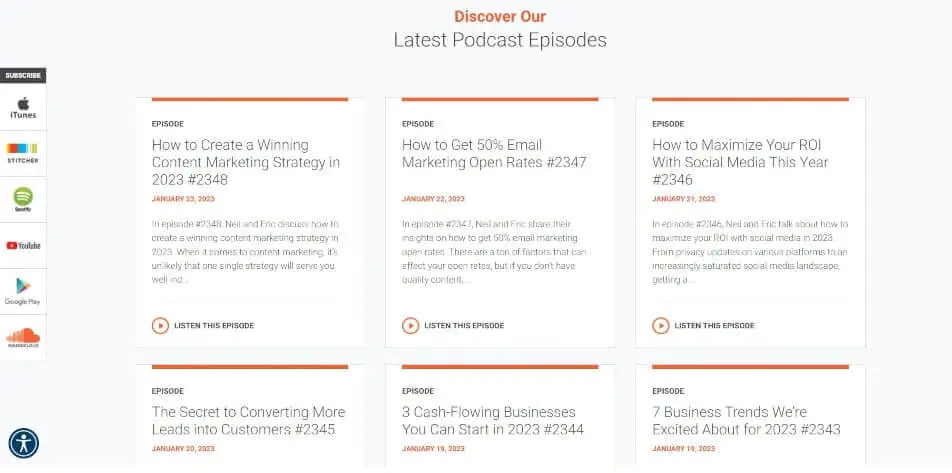
08 Aproveite o marketing por e-mail
Criar uma lista de e-mails de seus ouvintes e enviar-lhes atualizações regulares sobre o podcast é uma ótima maneira de mantê-los envolvidos e voltando para ouvir o mais novo episódio do podcast.
O marketing por e-mail pode ser uma excelente ferramenta para os proprietários de podcasts que desejam criar um público fiel. É uma ótima maneira de manter contato com seus ouvintes e desenvolver relacionamentos.
Por meio de e-mail, os proprietários de podcast podem fornecer aos assinantes conteúdo especial e lembretes sobre episódios de podcast. Além disso, é uma ótima maneira de informar ao público que você hospeda outros podcasts.
Com uma segmentação cuidadosa, os proprietários de podcasts podem garantir que seu conteúdo atinja as pessoas certas e aumente a popularidade do podcast!
O marketing por e-mail também fornece informações sobre o tipo de conteúdo que está repercutindo entre os usuários, pois os proprietários de podcasts podem rastrear quais tipos de e-mails geram mais interesse e envolvimento do público.
Quando bem feito, o marketing por e-mail de podcast não só o ajudará a criar uma tribo entusiasmada de fãs leais, mas também lhe dirá exatamente como fazer isso!
O Brand24 é uma ferramenta que rastreia mentions on-line em podcasts!
09 Publicar episódios de podcast no YouTube
A publicação de seus novos episódios de podcast no vídeo do YouTube pode expandir muito sua alcance da mídia social, envolver novos ouvintes e direcionar mais tráfego para seu site.
O YouTube é o segundo maior mecanismo de pesquisa depois do Google, portanto, faz sentido que os podcasters aproveitem essa plataforma para obter mais exposição e alcance.
A publicação do seu podcast no YouTube facilita a localização dos possíveis ouvintes e ajuda a atrair pessoas que têm menos probabilidade de ouvir do que de assistir.
O YouTube também oferece uma maneira fácil de incorporar seu podcast em sites e páginas de mídia social. Isso pode ajudá-lo a divulgar ainda mais a mensagem do seu podcast, e um aumento na visibilidade pode levar a mais downloads e assinantes.
Os vídeos do YouTube também podem ser usados para monetizar seu podcast por meio de anúncios e patrocínios, o que lhe dá a possibilidade de obter uma renda extra.
Por fim, o upload de episódios para o YouTube permite que os ouvintes assistam à versão em vídeo do podcast, o que pode ser uma ótima maneira de interagir com os espectadores que preferem conteúdo visual.
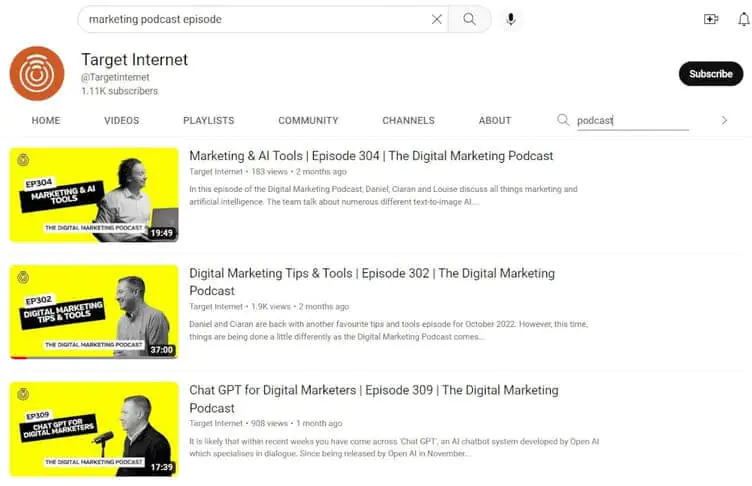
10 Pense em uma persona do ouvinte
Entender seu público-alvo é a base de qualquer estratégia de marketing bem-sucedida, e o podcasting não é exceção. Uma maneira eficaz de fazer isso é criar uma persona do ouvinte. A persona do ouvinte é uma representação semi-fictícia do seu ouvinte ideal, com dados demográficos, interesses e hábitos de escuta.
Por exemplo, vamos considerar uma persona chamada "Tech-Savvy Tim".
Tim é um engenheiro de software de 30 anos com grande interesse em tecnologias emergentes. Ele está sempre em busca de podcasts que possam lhe oferecer as mais recentes percepções sobre tendências tecnológicas e linguagens de codificação. Ao criar um conteúdo adaptado para atender às necessidades e aos interesses do "Tim experiente em tecnologia", você terá mais chances de atrair ouvintes que se encaixam nesse perfil.
Então, como você faz para criar uma persona do ouvinte?
Etapa 1: Definir objetivos
- Determine o que você deseja aprender com a persona do ouvinte, como interesses, faixa etária e hábitos de escuta.
Etapa 2: Escolha os métodos de coleta de dados
- Decida se vai usar pesquisas, enquetes de mídia social ou ambos para coletar dados.
Etapa 3: Criar perguntas
- Formule perguntas que visem às informações que você deseja coletar. Certifique-se de que elas se aprofundem em interesses, faixa etária e motivos para ouvir seu podcast.
Etapa 4: Use o Brand24 para obter insights sobre a mídia social
- Utilize o Brand24 para monitorar mentions e discussões sobre seu podcast nas mídias sociais. Isso pode fornecer dados valiosos sobre as preferências e os comportamentos de seu público.
Etapa 5: Realizar pesquisas e enquetes
- Distribua as pesquisas e enquetes para o seu público-alvo existente por meio de canais apropriados, como e-mail ou mídia social.
Etapa 6: Analisar dados
- Depois de coletar respostas suficientes, analise os dados para identificar padrões e tendências.
Etapa 7: Criar a persona do ouvinte
- Use os dados analisados para criar uma persona de ouvinte detalhada. Essa persona orientará seus esforços de criação de conteúdo e marketing.
Etapa 8: Implementar os resultados
- Aplique os insights da persona do ouvinte para adaptar o conteúdo do podcast e as estratégias de marketing.
A criação de uma persona de ouvinte ajuda no planejamento de conteúdo, publicidade e engajamento comunitário. Saber com quem você está falando pode tornar todas as suas estratégias de marketing de podcast mais eficazes e direcionadas.
11 Rede, rede, rede
O networking serve como base para o crescimento do podcast, abrindo portas para oportunidades que você talvez não encontrasse de outra forma.
Não se trata apenas de distribuir cartões de visita ou bater papo. A essência do networking está na formação de relacionamentos significativos e duradouros que podem levar a colaborações, patrocínios e até mesmo a oportunidades de participações em outros programas.
Vamos nos aprofundar em um exemplo prático.
Digamos que o foco de seu podcast seja o empreendedorismo. Nesse caso, participar de eventos de startups ou seminários de negócios pode ser incrivelmente benéfico. Esses eventos o colocam em contato direto com possíveis convidados que são especialistas na área, outros podcasters que podem estar abertos à colaboração e até mesmo empresas que desejam patrocinar conteúdo que se alinhe à sua marca.
A interação face a face que você obtém nesses eventos pode ser inestimável, dando-lhe a chance de causar uma impressão memorável que um e-mail ou uma mensagem de mídia social pode não transmitir.
No entanto, o cenário de networking vai além dos eventos físicos.
Plataformas de mídia social como LinkedIn, Twitter e comunidades on-line especializadas oferecem um terreno fértil para fazer novas conexões. Participe de discussões relevantes, compartilhe seus episódios e ofereça insights valiosos para se estabelecer como um líder de pensamento em seu nicho. Essa presença on-line pode atrair influenciadores e especialistas que podem se interessar em contribuir com o seu podcast, enriquecendo assim o seu conteúdo e expandindo o seu alcance.
A chave para um networking bem-sucedido é a reciprocidade. Sempre pense em como você pode oferecer valor às suas novas conexões, seja promovendo o trabalho delas, oferecendo uma plataforma para suas ideias ou colaborando em projetos mutuamente benéficos. Essa abordagem de dar e receber fortalece seus relacionamentos existentes e o torna uma conexão mais atraente para oportunidades futuras.
12 Realizar concursos e brindes
Uma das maneiras mais envolventes de atrair novos ouvintes e recompensar seu público fiel é por meio de concursos e brindes. Essas promoções podem criar um burburinho em torno do seu podcast, incentivando mais pessoas a sintonizarem, assinarem e até mesmo se tornarem membros ativos da comunidade do podcast.
Para um exemplo concreto, considere a possibilidade de realizar um concurso mensal em que os ouvintes possam ganhar uma consulta gratuita com um convidado especialista apresentado em seu programa.
Para participar, os ouvintes podem usar uma hashtag específica como #FreeConsultWith[YourPodcastName] nas mídias sociais. Isso incentiva os ouvintes a se envolverem com o seu podcast e serve como uma ferramenta promocional, pois a hashtag pode virar tendência e atrair novos ouvintes.
A mecânica do concurso pode ser tão simples ou tão complexa quanto você desejar. Você pode pedir aos ouvintes que respondam a uma pergunta relacionada a um episódio recente, compartilhem uma história pessoal ou até mesmo criem uma arte de fã. O segredo é tornar o concurso relevante para o conteúdo do seu podcast e atraente para o público-alvo.
Benefícios da realização de concursos e brindes:
- Envolvimento imediato do público
- Aumento da atividade e da visibilidade na mídia social
- Oportunidade de crescimento do público
- Coleta de dados valiosos do ouvinte
- Fortalecimento dos laços comunitários entre os ouvintes
- Maior fidelidade à marca
- Potencial para efeitos de marketing viral
- Aumento de downloads e assinaturas de episódios
Lembre-se de que o objetivo final dessas promoções não é apenas aumentar os números temporariamente. É criar um público mais engajado e fiel.
13 Envolva seus ouvintes em todos os lugares possíveis
Um podcast de sucesso depende de mais do que apenas conteúdo de alta qualidade. Criar uma comunidade de ouvintes engajados é igualmente importante. Para conseguir isso, você precisa interagir com seu público em várias plataformas, não apenas onde os episódios do podcast estão hospedados.
Por exemplo, o Instagram Stories oferece uma maneira exclusiva de interagir com seu público.
Você pode publicar enquetes rápidas ou sessões de perguntas e respostas relacionadas ao seu último episódio. Essa interação em tempo real mantém seu público envolvido e fornece feedback valioso. Você pode avaliar quais tópicos repercutem entre os ouvintes e sobre o que eles gostariam de ouvir mais em episódios futuros.
O Twitter é outra plataforma que pode ser aproveitada para o envolvimento dos ouvintes.
Você pode twittar citações interessantes de seus episódios ou compartilhar conteúdo dos bastidores. Esse tipo de conteúdo pode criar expectativa para os próximos episódios e manter seu podcast na mente de seus seguidores.
O LinkedIn oferece um tipo diferente de engajamento.
Aqui, você pode publicar artigos que se aprofundam nos tópicos abordados no seu podcast. Esses artigos podem servir como material suplementar que agrega uma camada extra de valor aos seus episódios. É uma maneira de se estabelecer como um líder de pensamento em seu nicho, atraindo um público mais profissional que talvez não seja alcançado por meio de outras plataformas.
14 Executar publicidade paga
Investir em publicidade paga pode dar ao seu podcast o impulso de que ele precisa para atingir um público mais amplo. Ao contrário do crescimento orgânico, que exige tempo e esforço constante, a publicidade paga oferece resultados imediatos. Ela permite que você segmente dados demográficos específicos, tornando seu alcance mais focado e eficaz.
Por exemplo, o Facebook Ads pode ser uma ferramenta poderosa para a promoção de podcasts.
Se o seu podcast for sobre culinária vegana, você poderá segmentar usuários que seguem páginas de receitas veganas ou são membros de grupos de estilo de vida vegano. Isso garante que seus anúncios sejam vistos por pessoas que já estão interessadas em seu nicho, aumentando a probabilidade de obter ouvintes dedicados.
O Google Ads é outra plataforma que pode ser altamente eficaz, especialmente para podcasts que abordam tópicos especializados.
Você pode usar palavras-chave para segmentar pessoas que estão pesquisando conteúdo em seu nicho. Se o seu podcast for sobre fotografia digital, palavras-chave como "melhores câmeras DSLR" ou "dicas de fotografia" podem ajudar seus anúncios a atingir um público-alvo que provavelmente se interessará pelo seu conteúdo.
Mas a publicidade paga não se trata apenas de alcançar novos ouvintes.
Ele também pode ser usado para reengajar com seu público existente. Plataformas como o Instagram e o Twitter permitem que você crie campanhas de redirecionamento. Essas campanhas mostram seus anúncios para pessoas que interagiram anteriormente com seu podcast ou site, lembrando-as de sintonizar seus episódios mais recentes.
15 Participe de uma comunidade existente em seu nicho
Participar de uma comunidade relacionada ao nicho do seu podcast oferece uma série de benefícios. Isso lhe dá acesso imediato a um público que já tem interesse no seu assunto. As comunidades são centros de discussões, perguntas e compartilhamento de conteúdo valioso. Elas oferecem um pulso sobre o que é tendência e o que é mais importante para seus possíveis ouvintes.
Veja, por exemplo, um podcast voltado para o marketing digital.
Os grupos do LinkedIn e as comunidades do Reddit são excelentes plataformas para esse nicho. Esses espaços on-line costumam ser frequentados por profissionais e entusiastas que discutem as últimas tendências, compartilham artigos e buscam orientação. A participação ativa nessas comunidades permite que você ofereça suas próprias percepções e conhecimentos. Isso estabelece sua credibilidade e atrai ouvintes que consideram suas contribuições valiosas.
A participação em uma comunidade vai além da mera autopromoção.
Trata-se de agregar valor às conversas que já estão ocorrendo. Responda a perguntas, ofereça soluções e compartilhe episódios relevantes do seu podcast, quando apropriado. Essa abordagem ajuda a fortalecer sua reputação na comunidade.
O envolvimento com uma comunidade em seu nicho é um investimento de longo prazo. Ele ajuda você a entender melhor o seu público, mantém você atualizado sobre as tendências do setor e oferece uma plataforma para o crescimento orgânico. Com o tempo, esse envolvimento pode contribuir significativamente para o sucesso e a sustentabilidade de seu podcast.
Conclusão
O marketing de podcast é um processo contínuo e exige esforço constante. É importante ser criativo e experimentar diferentes táticas para descobrir o que funciona melhor para o seu podcast.
Além disso, é essencial acompanhar e medir seus resultados para ver o que está funcionando e o que não está, para que você possa ajustar sua estratégia de acordo.
Em conclusão, o marketing de podcast é uma maneira poderosa de promover sua marca. Combinando as estratégias de marketing de podcast discutidas acima, você pode aumentar sua visibilidade, atingir um público mais amplo e criar seguidores fiéis para o seu podcast.
Deseja aumentar seu público? Comece a monitorar podcasts agora mesmo!
PERGUNTAS FREQUENTES
O que é marketing de podcast?
O marketing de podcast refere-se ao uso de podcasts para promover uma marca, um produto ou um serviço. Isso pode ser feito de várias maneiras:
- Criando e hospedando um podcast: Uma empresa pode criar e hospedar seu próprio podcast, usando-o como uma plataforma para compartilhar conteúdo valioso, discutir tendências do setor ou destacar os produtos ou serviços da empresa. A plataforma de hospedagem de podcast é usada para distribuir o podcast em vários diretórios de podcast, tornando-o acessível a um público amplo.
- Patrocínio de podcasts existentes: Uma empresa pode patrocinar um podcast existente que se alinhe à sua marca e ao seu público-alvo. Isso geralmente envolve o pagamento de anúncios de podcast, que normalmente são lidos pelo apresentador do podcast durante o programa e promovem a empresa ou suas ofertas.
- Aparições de convidados: Um representante da empresa, como um CEO ou outro especialista, pode aparecer como convidado em um podcast. Isso lhes dá a oportunidade de compartilhar seus conhecimentos, contar a história da empresa e se conectar com um novo público.
O mercado de podcasts está saturado?
É claro que o mercado de podcasts pode parecer supersaturado devido ao grande número de podcasts existentes em vários gêneros. Entretanto, isso não significa que não haja espaço para mais. O sucesso nessa esfera não é necessariamente prejudicado pela quantidade de podcasts, mas sim determinado pela exclusividade e qualidade do conteúdo do podcast.
As principais táticas de marketing de podcast, como ter um ponto de vista exclusivo, um áudio de podcast com som profissional, lançar novos episódios de forma consistente e uma abordagem dedicada a oferecer qualidade, podem fazer com que o seu podcast se destaque em um mercado lotado.
Em resumo, embora existam muitos podcasts disponíveis, um podcast bem planejado e executado que ofereça algo exclusivo tem todas as chances de conquistar uma base substancial de ouvintes e alcançar o sucesso.
Como você cria uma estratégia de marketing para um podcast?
A criação de uma estratégia de marketing para um podcast envolve várias etapas, todas voltadas para a criação de um podcast bem-sucedido e para alcançar um público existente ou atrair um novo público.
- Defina seu público-alvo: Entender quem são seus ouvintes pode orientar o conteúdo que você cria e como o comercializa.
- Desenvolva conteúdo exclusivo e envolvente: Crie conteúdo exclusivo e envolvente para o seu público. Esse é o primeiro passo para um podcast de sucesso.
- Crie um plano promocional: Use a mídia social, publicações em blogs, boletins informativos por e-mail e outras plataformas para promover o seu podcast. Isso também pode incluir a colaboração com outros podcasters para promoção cruzada.
- Envolva-se com seu público: Interaja com seu público-alvo nas mídias sociais, responda a comentários, peça feedback e participe de discussões relacionadas ao tópico do podcast. Isso pode ajudar a criar uma base de ouvintes fiéis.
- Otimize para SEO: Certifique-se de que o título, a descrição e o conteúdo do site do seu podcast estejam otimizados para os mecanismos de busca. Isso ajudará os novos ouvintes a encontrar seu podcast.
- Utilize seu público-alvo existente: Se você já tem um público em um blog, canal do YouTube ou mídia social, aproveite esses seguidores para aumentar o seu podcast. Informe-os sobre seu podcast e forneça links fáceis para acessá-lo.
- Analisar e ajustar: Use a análise para entender quais episódios são mais populares, de onde vem o seu público e como ele está ouvindo. Use esses dados para ajustar sua estratégia e seu conteúdo conforme necessário.
Como faço para conseguir 1.000 ouvintes para meu podcast?
Para conseguir 1.000 ouvintes para seu podcast, considere as seguintes táticas:
- Otimize o título do seu podcast: Crie um título de podcast cativante e descritivo que atraia possíveis ouvintes e represente com precisão o conteúdo do seu programa.
- Envie seu podcast para diretórios: Publique seu podcast em diretórios populares como Apple Podcasts, Spotify, Google Podcasts e outros. Isso aumenta a visibilidade e torna mais fácil para os ouvintes encontrarem seu programa.
- Aproveite seu feed RSS: Utilize o feed RSS do seu podcast para distribuir automaticamente novos episódios para diretórios e aplicativos de podcast. Isso garante que seu conteúdo alcance um público mais amplo.
- Promova através da mídia social: Utilize as plataformas de mídia social para compartilhar atualizações de episódios, conteúdo de bastidores e interagir com seu público. Incentive o compartilhamento e a interação para expandir seu alcance.
- Colaborar com outros podcasters: Busque oportunidades de colaborar com outros podcasters, aparecendo como convidado nos programas deles ou convidando-os para serem convidados em seu próprio programa. Essa promoção cruzada expõe seu podcast a novos públicos.
- Ofereça conteúdo valioso: Crie episódios envolventes e de alta qualidade que agreguem valor ao seu público-alvo. Forneça consistentemente conteúdo que informe, entretenha ou inspire os ouvintes, incentivando-os a se inscrever e compartilhar com outras pessoas.
- Incentive as avaliações e classificações: Peça aos ouvintes que deixem comentários e classificações nos diretórios de podcast. O feedback positivo aumenta a credibilidade e ajuda a atrair novos ouvintes.
- Utilize sua rede existente: Aproveite sua rede existente, incluindo amigos, familiares, colegas e comunidades on-line, para divulgar seu podcast. Solicite o apoio deles para assinar, compartilhar e recomendar seu programa.
- Convidar blogueiros ou escrever artigos: Contribua com guest posts para blogs ou publicações relevantes, compartilhando sua experiência e incluindo links para o seu podcast. Isso pode atrair novos ouvintes que descobrem seu conteúdo por meio desses artigos.
- Envolva-se com seu público: Interaja ativamente com seus ouvintes respondendo a comentários, perguntas e feedback. Crie um senso de comunidade em torno do seu podcast, promovendo a fidelidade e incentivando os ouvintes a se tornarem defensores do seu programa.




